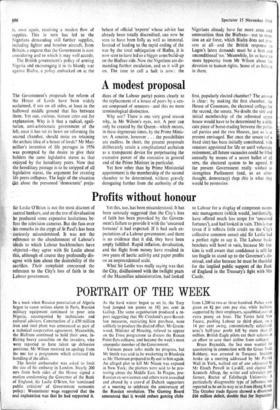Profits without honour
Sir Leslie O'Brien is not the most discreet of central bankers, and on the eve of devaluation he produced some expensive hesitations be- fore the television cameras. But the fuss over his remarks in the crypt of St Paul's has been curiously misunderstood. It was not the reference to the abandonment of Labour's ideals to which Labour backbenchers have objected—they agree with Sir Leslie about this, although of course they profoundly dis- agree- with him about the desirability of the sacrifice. Their complaint concerned the reference to the City's loss of faith in the Labour government. Yet this, too, has been misunderstood. It has been seriously suggested that the City's loss of faith has been provoked by the Govern- ment's failure to provide it with the 'unearned fortunes' it had expected. If it had such ex- pectations of a Labour government, and there is no evidence that it did, they have been amply fulfilled. Rapid inflation, devaluation, and the flight from money have resulted in two years of hectic activity and paper profits on an unprecedented scale.
What Sir Leslie was really saying was that the City, disillusioned with the twilight years of the Macmillan administration, had looked to Labour for a display of competent econo- mic management (which would, incidentally, have offered much less scope for 'unearned fortunes'), and had looked in vain. This is true (even if it reflects little credit on the City's collective common sense) and Sir Leslie had a perfect right to say it. The Labour back- benchers will howl in vain, because Mr Jen- kins is well aware that confidence is still far too fragile to stand up to the Governor's dis- missal, and also because he must be thankful for the implied public support of the Bank of England in. the Treasury's fight with Mrs Castle.






































 Previous page
Previous page